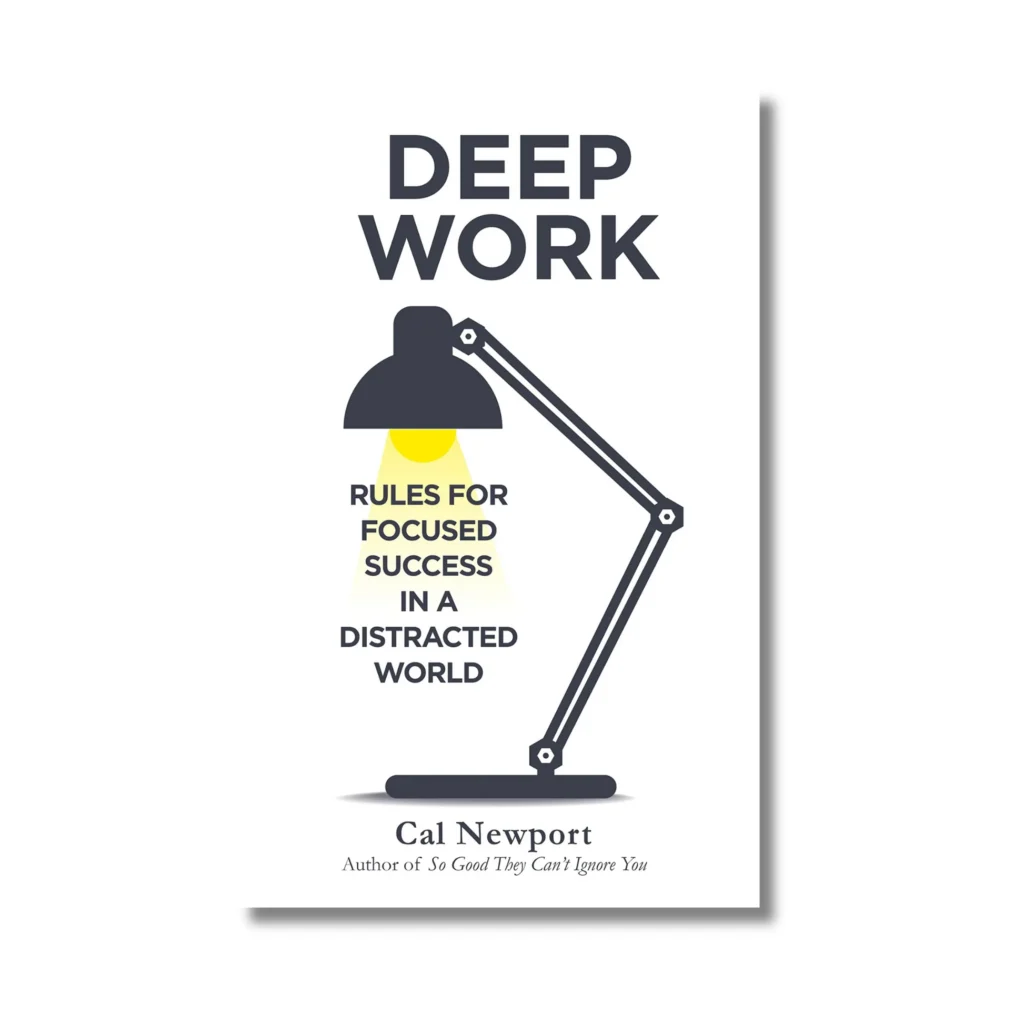Deep Work: Rules for Focused Success in a Distracted World by Cal Newport is a transformative guide on how to cultivate deep, uninterrupted focus in a world full of distractions. In this book, Newport argues that the ability to perform deep work—intense, focused, and cognitively demanding tasks—is a rare skill in today’s digital age, but it is also the key to achieving extraordinary success in both personal and professional life.

The Importance of Deep Work
Deep Work Defined: Newport defines deep work as the state of being fully immersed in a task that requires your full cognitive abilities. It’s a level of concentration that allows you to produce high-quality, valuable work in less time.
Shallow Work: On the other hand, shallow work consists of tasks that are non-cognitively demanding and often performed while distracted, such as answering emails, attending meetings, or browsing social media. While necessary, shallow work doesn’t lead to significant personal or professional growth.
Why It Matters: Newport emphasizes that deep work is essential for mastering complex skills and creating high-value results. Those who can consistently engage in deep work can outperform those who spend their time on shallow tasks. The ability to work deeply is more valuable than ever, as it leads to more meaningful achievements and a higher level of productivity.
The Deep Work Hypothesis
Newport introduces the Deep Work Hypothesis, which posits that the deep work you produce is of higher quality and completed faster than the shallow work you do. He explains that those who embrace deep work and prioritize it over shallow tasks are the ones who achieve the highest levels of success in today’s knowledge economy.
• The Opportunity Cost of Shallow Work: By constantly engaging in shallow work, you miss out on the opportunity to achieve significant breakthroughs and grow your skills.
• Cognitive Capital: Your ability to focus and work deeply is a finite resource. If you waste it on shallow tasks, you squander your potential for high-level accomplishments.
The Rules for Deep Work
Newport outlines four rules to help you embrace deep work in your own life. These rules provide a practical framework for overcoming distractions, building focus, and achieving success:
1. Work Deeply
- Establish routines and rituals that encourage deep work. Whether it’s setting specific times for deep work, creating a distraction-free workspace, or developing rituals to signal your brain that it’s time to focus, creating conditions for deep work is essential.
- Action Step: Set aside blocks of time each day dedicated solely to deep work, and eliminate distractions (phone, social media, emails) during these periods.
2. Embrace Boredom
- One of the biggest challenges in today’s world is our constant desire for stimulation. Newport suggests training your brain to embrace boredom by avoiding constant distractions and cultivating the ability to focus for long periods of time.
- Action Step: Practice focusing without checking your phone or taking breaks. Over time, you’ll build your attention span and ability to focus deeply.
3. Quit Social Media
- Newport argues that social media and other digital distractions are among the biggest barriers to deep work. While not everyone needs to quit social media entirely, Newport encourages a more thoughtful approach to how you use these platforms.
- Action Step: Take inventory of the digital tools and apps you use daily and assess whether they are adding value to your life or simply distracting you from your deeper goals.
4. Drain the Shallows
- Minimize time spent on shallow tasks that don’t contribute to your long-term goals. Newport suggests scheduling every minute of your day to ensure that shallow work is minimized, and deep work takes precedence.
- Action Step: Block out time for shallow tasks, but be intentional about them. Try to limit their scope so they don’t eat into your deep work time.
The Power of Focused Work
Increased Productivity: By dedicating uninterrupted time to deep work, you can accomplish much more in less time. Newport explains that focusing deeply on a task allows you to achieve results that would otherwise take far longer if you were distracted.
Skill Development: The more time you spend in deep work, the faster you’ll improve your skills. Whether you’re learning a new language, mastering a craft, or solving complex problems, deep work allows you to reach your potential faster.
Quality Over Quantity: Deep work emphasizes the importance of quality over quantity. Instead of spreading yourself thin, focusing on fewer tasks with greater intensity will help you create better outcomes.
Who Should Read This Book?
Professionals and Entrepreneurs: If you’re looking to gain a competitive edge in your career or business, Deep Work will teach you how to focus on high-value tasks that lead to greater success.
Students and Learners: Students looking to master complex subjects or achieve academic success will benefit from adopting deep work principles to improve focus and retention.
Creative Individuals: Writers, artists, and other creatives will find this book particularly helpful in cultivating the focus and discipline needed to produce meaningful work.
Final Thoughts
In Deep Work, Cal Newport provides a compelling argument for the value of focused, distraction-free work in achieving meaningful success. He offers practical strategies to eliminate distractions, maximize productivity, and make significant strides in your personal and professional life. The message is clear: in a world full of distractions, the ability to work deeply is the key to exceptional achievements.
“Deep work is not just a skill. It’s the most valuable skill you can develop in today’s knowledge economy.” – Cal Newport
By applying the principles in Deep Work, you can unlock your full potential and create a life filled with productivity, purpose, and meaningful accomplishments. Ready to focus and dive into your most important work?










